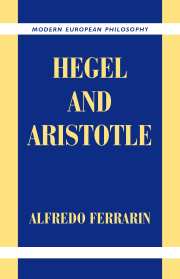Book contents
- Frontmatter
- Contents
- Acknowledgments
- List of Abbreviations
- Introduction
- PART I THE HISTORY OF PHILOSOPHY AND ITS PLACE WITHIN THE SYSTEM
- PART II LOGIC AND METAPHYSICS
- 3 The Lectures on the Metaphysics
- 4 The Aristotelian Heritage in the Science of Logic
- 5 Aristotelian Questions
- 6 Essence and Concept
- PART III ARISTOTLE AND THE REALPHILOSOPHIE
- PART IV CONCLUSIONS
- Bibliography
- Index
4 - The Aristotelian Heritage in the Science of Logic
Published online by Cambridge University Press: 22 October 2009
- Frontmatter
- Contents
- Acknowledgments
- List of Abbreviations
- Introduction
- PART I THE HISTORY OF PHILOSOPHY AND ITS PLACE WITHIN THE SYSTEM
- PART II LOGIC AND METAPHYSICS
- 3 The Lectures on the Metaphysics
- 4 The Aristotelian Heritage in the Science of Logic
- 5 Aristotelian Questions
- 6 Essence and Concept
- PART III ARISTOTLE AND THE REALPHILOSOPHIE
- PART IV CONCLUSIONS
- Bibliography
- Index
Summary
Of all the phenomena which exist near by us to phainesthai itself is the most admirable.
(T. Hobbes, De Corpore)Being and Essence
“Hegel's interpretation of the theological passage in Aristotle seems characterized by the preoccupation of giving life and movement to the Absolute and of seeing in the self-position of the first substance a sort of exemplary act indefinitely repeatable at inferior levels.” Even though it is easy for Aubenque, who does not check the Erasmus edition to castigate Hegel for all his “mistakes,” it is hard not to concur with this judgment. On the other hand, Hegel would have agreed with Aubenque's emphasis on the impossibility of deducing the categories from substance in Aristotle (VGPh 133). What he would not have agreed with is the consequence drawn by Aubenque in his interpretation of the Metaphysics, that is, that the ineffable transcendence and separation of Aristotle's God from the sensible world is necessarily implied by the univocity of meaning in the demonstrative sciences and results in a “hyperplatonism.”
What Hegel says in the Lectures, however, far from exhausts all he has to say about the Metaphysics. There are several passages in the Science of Logic and the Encyclopædia Logic which are both explicit and implicit comments on it, as well as on the Physics. This chapter, in which we consider Hegel's confrontation with Aristotle within his own logics and the extent to which he would have considered himself an Aristotelian, thus supplements Chapter 3.
- Type
- Chapter
- Information
- Hegel and Aristotle , pp. 129 - 148Publisher: Cambridge University PressPrint publication year: 2001



